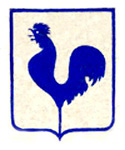Accounts of the deeds and gestes of medieval knights include the story of the First Communion of Vivien, still a youth, on the eve of the Battle of Aliscans in 793.

The coat of arms of the Count of Toulouse |
Aliscans was the great battle in which Count William of Toulousse, the cousin of Charlemagne and one of his best commanders and most trusted counsellors, halted the advance of Muslims at the river Orbieux at Villedaigne. The Saracens claimed the victory at Aliscans, but the obstinate resistance of the Christian army so exhausted their strength they were forced to retreat to Spain. Thus, the victory of the pagan was soon turned to defeat in face of the courage shown by the vanquished.
On the evening of the first day of battle, Count William went out to the field of battle where so many Frenchmen lay dead or dying on the ground, their hands crossed over their chests. There he found his nephew, Vivien, still a youth, who lay mortally wounded. He knelt beside him and gently raised the head of the dying young man.
A thought struck William. This young man was about to die without ever having received Holy Communion. The Count recalled that the priest had given him a portion of the Sacred Host that morning before the battle began, and as he remembered this, Vivien roused a little.
“Will you not eat of the Sacred Host?” Count William asked him.
Vivien nodded, and the old knight, in a solemn voice, went on: “You will make your confession to me, because we have no priest, and I am a relative and near you.”
This was soon done. Then, taking the Host from his pouch, William raised it, adored it, and then placed it on the lips of the dying youth.
“And angels in their thousands were present to witness the sight and to bear that soul to Heaven in all their gentleness,” ends the Chanson.
*
In 803 William of Toulouse successfully avenged the defeat at Aliscans and the death of his nephew Vivien by taking Barcelona from the Saracens. In the next year, he founded the monastery of Gellone (now Saint Guilhem-le Desert), and in 806 he entered it as a monk. He died there in the odor of sanctity on May 28, 852.
From the Chanson de Guillaume [The Song of William],
a French epic poem dating from about 1100

Posted June 11, 2008


Related Topics of Interest
 Hernan Perez del Pulgar, “He of the Valiant Deeds” Hernan Perez del Pulgar, “He of the Valiant Deeds”
 The Investiture of a Knight The Investiture of a Knight
 Theophilus: The Man Who Sold His Soul to the Devil Theophilus: The Man Who Sold His Soul to the Devil
 Ranulf of Chester Ranulf of Chester
 The Epic Journey of Don Juan de Oñate The Epic Journey of Don Juan de Oñate
 Chanticleer Chanticleer
 The Debasement of Knighthood The Debasement of Knighthood

|